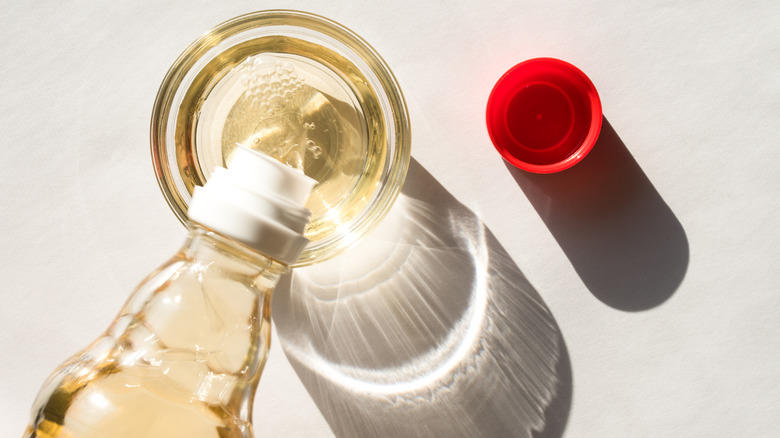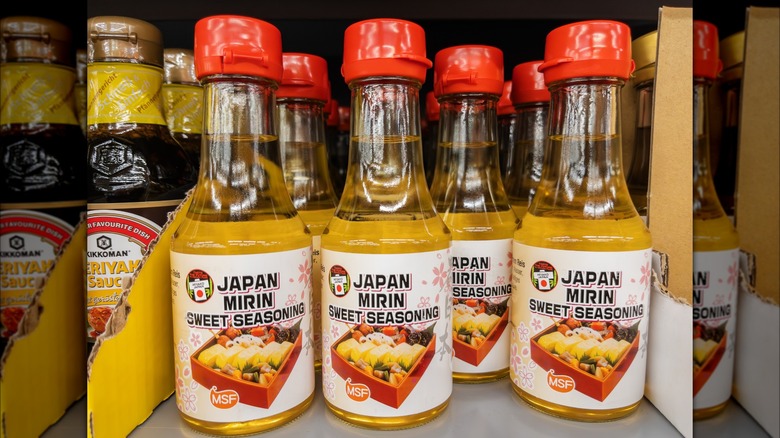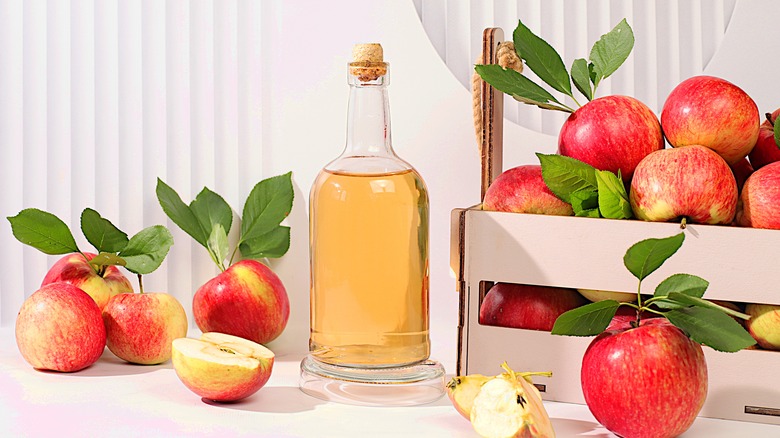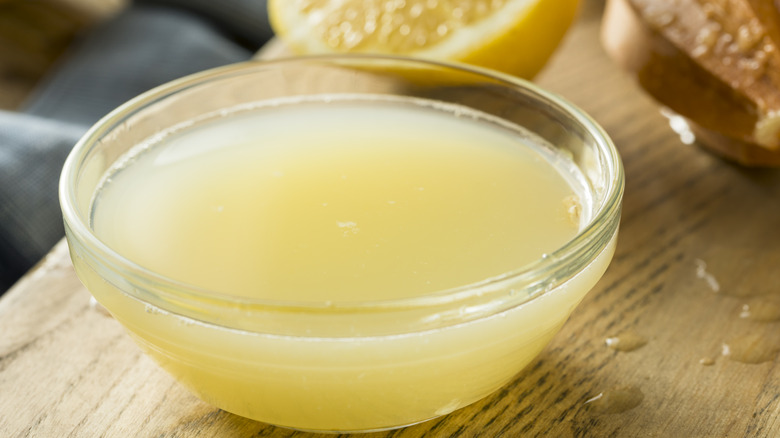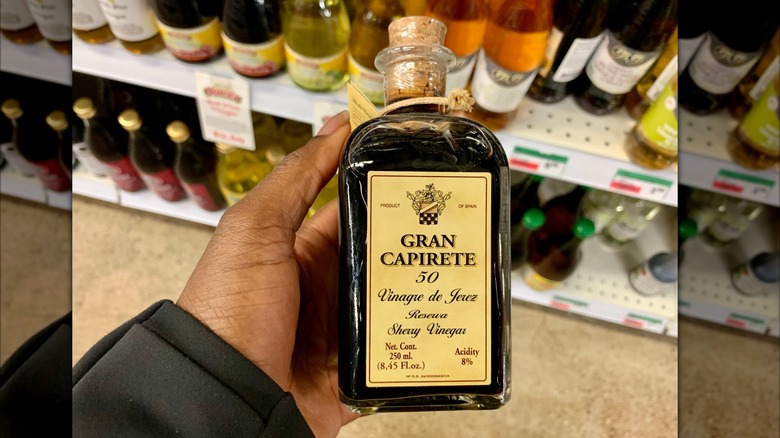4 Close Substitutions For Rice Vinegar
Rice vinegar is not necessarily a staple in American pantries, which can be frustrating if you come across a new recipe that calls for it. It is made from fermented rice and is commonly used in Asian-style dishes, and while rice vinegar and rice wine vinegar are very similar, be sure not to confuse the two, as they come from different parts of the fermentation process. For rice vinegar, rice is first cooked and then combined with a fermentation starter in water. (This is actually the part of the process that makes rice wine by turning the starches in rice into sugar, which then forms alcohol.) A second fermentation process introduces a new type of bacteria to the rice wine, which then produces acid before it eventually becomes vinegar.
What you end up with is a mild and sweet vinegar that's often used in dressings, pickles, and marinades. One of the most common uses for rice vinegar is for sushi rice. In fact, sushi translates to "sour rice" in Japanese. If you find yourself mid-cooking and in need of rice vinegar that's not in your pantry, here are four close substitutes to save the day (and your dish).
Mirin
When it comes to a close rice vinegar substitute, mirin is up there in terms of similarities. Mirin is a Japanese rice wine, which means it comes from the same fermentation process as rice vinegar, but it is only fermented for at least a few months. The Japanese word mirin is formed through a combination of meanings. Mi is Japanese for taste or flavor, and rin is Japanese for "to remove astringency" which makes sense because the rice wine does not go through the second fermentation process that introduces the acid (aka the astringency) to make rice vinegar.
In terms of differences, the alcohol in mirin is never fermented out, which gives it a sweeter, more umami flavor compared to rice vinegar's acidic kick. Mirin is typically used to flavor fried rice dishes or to give teriyaki-sauce-like marinades that nice glaze-based shine. One downside to using mirin instead of rice vinegar is it brings a lot of sweetness to a dish. This might be fine if you're trying to boost the flavor of meat, salads, or noodle dishes. But it's not a good replacement for rice vinegar if you want that sour, pickled bite. If you do decide to use mirin, you can do a 1-to-1 replacement without any amending necessary.
Apple cider vinegar
Apple cider vinegar is a multi-purpose miracle brew long believed to have some pretty incredible health benefits – although there hasn't been any decisive research confirming the validity of these long-rumored remedies. Regardless, the little bit of antioxidants and probiotics can't hurt. Just like rice vinegar, apple cider vinegar is also concocted through the fermentation process. But unlike rice vinegar, apple cider vinegar is made with a combination of crushed apples, yeast, and sugar.
Some people believe that apple cider vinegar is the closest match to rice vinegar considering it packs the same amount of sweetness and sourness. It should be noted that apple cider vinegar is more robust in both flavors, so swap wisely. Like mirin, apple cider vinegar also calls for a 1-to-1 replacement, with no need to adjust anything. Because apple cider and rice wine vinegar both lend themselves well to dressings and marinades, this is where we'd recommend you experiment with replacements. However, apple cider vinegar won't likely bring the same kind of subtly as rice vinegar to something like sushi rice, for example.
Lemon juice
Using lemon juice may sound like it's a substitute coming out of left field, but when it comes to bringing the acidity to a dish, you know lemons have you covered. We can barely look at the photo above without our cheeks puckering. Another benefit to adding lemon juice to your dish is that it makes your food healthier. Unlike apple cider vinegar, lemon juice is a proven healthy source of vitamin C, fiber, and other healing nutrients.
One thing to note, though: Rice vinegar boasts a sweeter flavor profile, whereas lemon juice is mostly acid. While the two carry the same acidity level, with rice vinegar and lemon juice both having a pH of 2-3, there is very little sugar in a lemon to balance that sharpness out. If you do decide to swap out our rice vinegar for lemon juice we recommend using a 1:1 ratio, but also adding a little brown sugar or honey to bring back some of that sweetness lost in the swap.
Sherry vinegar
Sherry vinegar is another excellent swap for rice vinegar, and one can say that it's balsamic's cool, Spanish cousin. It's one of those staple ingredients that you should always have hanging out in your pantry. Made from sherry wine (which is made from white grapes), sherry vinegar is fermented and aged for anywhere from 6 months to 2 years. One thing that makes sherry vinegar stand out from its vinegar brethren is that in addition to its acidic profile, it also boasts a lightly nutty, caramel flavor.
Sherry vinegar is another one of those 1:1 rice vinegar matches. Just like rice vinegar, sherry vinegar is good in soups, salads, and over veggies. But be aware that the star characteristic of sherry vinegar is its complex and nutty notes, whereas the star characteristic of rice vinegar is its subtlety. If a dish calls for rice vinegar because of its subtle sweet and sour flavor, you may want to go with apple cider vinegar as a substitute instead.
